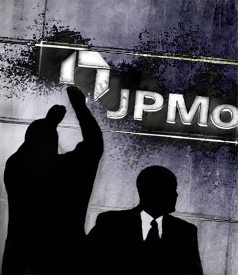Did you know that Truthout is a nonprofit and independently funded by readers like you? If you value what we do, please support our work with a donation.
Late last night, the U.S. Senate rejected the single most important element of Wall Street reform by a vote of 33 to 61. The SAFE Banking Act would have forced the break-up of the nation’s six largestbanks, and dramatically reduced the political clout of America’s financial elite. The 61 votes against the measure are votes in favor of Wall Street’s stranglehold on our economy. No matter what else is ultimately enacted in the name of Wall Street reform, Congress has decided that it will not confront the single greatest problem in the U.S. economy: Too Big To Fail.
On Wednesday, the Senate also voted down a $50 billion Wall Street tax that would have been used to fund the cost of shutting down a major failing bank. By rejecting both the break-up bill and the bank tax, the Senate has punted on ending too-big-to-fail. For now, it appears that Wall Street has emerged from the Great Financial Crash of 2008 with even greater political might than it wielded during the reign of George W. Bush. In the Citizens United era, both Democrats and Republicans have decided they can only get so tough with Corporate America.
Last night, 27 Democrats joined all but three Republicans to vote against breaking up the banks. President Barack Obama opposed both the tax and the break-up measures, and hosted J.P. Morgan Chase CEO Jamie Dimon for dinner at the White House on Monday. J.P. Morgan is the largest U.S. bank, and spent more money on lobbying in 2009 than any other bank. House Minority Leader John Boehner (R-OH) has aggressively courted Dimon for campaign cash.
There is literally no economic evidence that megabanks do anything to help the economy that cannot be accomplished with smaller institutions. By contrast, centuries of research has shown that giant banks are destructive. Adam Smith was warning against the dangers of megabanking back in the 18th Century. There are plenty of good economic reasons to cut our financial behemoths down to size, and no good reasons not to.
The good news is, there are still some smaller-bore reforms in the legislation that are worth voting for, and it appears that some version of reform, however tepid, will ultimately be approved. Congress will be deploying a screwdriver to perform a job fit for a bulldozer, but a few weeks ago, it was not obvious that even the screwdriver would make it through.
Shortly before the vote on breaking up the banks, Sen. Bernie Sanders (I-VT) cut a deal with Sen. Chris Dodd (D-CT) that would subject all of the Federal Reserve’s bailout operations to a thorough public audit. Despite all of the attention heaped on the Treasury Department and the Troubled Asset Relief Program, the Fed has operated as the chief bailout engine of the U.S. government, pumping $4.3 trillion into the banking system without almost no public disclosure. We don’t know who received money, or on what terms, or who approved the transactions. It now appears very likely that this information will finally see the light of day. Obama, who had opposed a more comprehensive Fed audit, now supports the Sanders plan.
But by allowing megabanks to remain super-sized, Congress has insulated them from the fallout associated with the Fed disclosures, and given them a tool to fight other reforms. Our giant financial institutions are not only too-big-to-fail, they are too-big-to-regulate. There are meaningful reforms still on the table—a ban on risky proprietary trading, an overhaul of consumer protection and the reining in of the crazy derivatives casino that brought down AIG—but all will be much more difficult to enforce at the complex megabanks which currently dominate both the marketplace and Capitol Hill.
Major economic realignments are not quickly established. It took seven years for Franklin Delano Roosevelt to pass all of his New Deal-era banking reforms. We have known for some time that this legislation, however stringent, would be incomplete. Hedge funds, credit rating agencies, Fannie Mae and Freddie Mac all must be addressed by separate legislation. The SAFE Banking Act must be considered in every subsequent reform package.
Here are the Senators who voted last night to preserve Wall Street’s power. Senators in bold also voted for the bailout bill in 2008:
Akaka (D-HI)
Alexander (R-TN)
Barrasso (R-WY)
Baucus (D-MT)
Bayh (D-IN)
Bennet (D-CO)
Bond (R-MO)
Brown (R-MA)
Brownback (R-KS)
Burr (R-NC)
Carper (D-DE)
Chambliss (R-GA)
Cochran (R-MS)
Collins (R-ME)
Conrad (D-ND)
Corker (R-TN)
Cornyn (R-TX)
Crapo (R-ID)
Dodd (D-CT)
Enzi (R-WY)
Feinstein (D-CA)
Gillibrand (D-NY)
Graham (R-SC)
Grassley (R-IA)
Gregg (R-NH)
Hagan (D-NC)
Hatch (R-UT)
Hutchison (R-TX)
Inhofe (R-OK)
Inouye (D-HI)
Isakson (R-GA)
Johanns (R-NE)
Johnson (D-SD)
Kerry (D-MA)
Klobuchar (D-MN)
Kohl (D-WI)
Kyl (R-AZ)
Landrieu (D-LA)
Lautenberg (D-NJ)
LeMieux (R-FL)
Lieberman (ID-CT)
McCain (R-AZ)
McCaskill (D-MO)
McConnell (R-KY)
Menendez (D-NJ)
Murkowski (R-AK)
Nelson (D-FL)
Nelson (D-NE)
Reed (D-RI)
Risch (R-ID)
Roberts (R-KS)
Schumer (D-NY)
Sessions (R-AL)
Shaheen (D-NH)
Snowe (R-ME)
Tester (D-MT)
Thune (R-SD)
Udall (D-CO)
Voinovich (R-OH)
Warner (D-VA)
Wicker (R-MS)
Speaking against the authoritarian crackdown
In the midst of a nationwide attack on civil liberties, Truthout urgently needs your help.
Journalism is a critical tool in the fight against Trump and his extremist agenda. The right wing knows this — that’s why they’ve taken over many legacy media publications.
But we won’t let truth be replaced by propaganda. As the Trump administration works to silence dissent, please support nonprofit independent journalism. Truthout is almost entirely funded by individual giving, so a one-time or monthly donation goes a long way. Click below to sustain our work.
